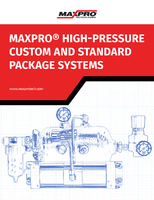Standard addresses seat belt assemblies on tractors.
Press Release Summary:
Published in English and French, ISO 3776-3:2009 was developed by technical experts from Europe, Asia, North and South America, working through committee of ISO. International standard specifies requirements for seat belt assemblies on agricultural tractors and self-propelled machinery, and is the third in a series of standards related to seat belt requirements. Compliance with this and other ISO standards for seat belt assemblies will minimize risk to both operator and equipment.
Original Press Release:
New Standard Announced for Seat Belt Assemblies on Tractors
ST JOSEPH, MICHIGAN - The American Society of Agricultural and Biological Engineers (ASABE) announces the publication of an international standard that specifies the requirements for seat belt assemblies used on agricultural tractors and self-propelled machinery.
ISO 3776-3:2009, "Tractors and machinery for agriculture - Seat belts - Part 3: Requirements for assemblies," was recently published in English and French for the international community. This document is the third in a series of standards related to seat belt requirements
Technical experts from Europe, Asia, North and South America, working through a committee of the International Organization for Standardization (ISO), participated in the development of this new standard. ISO 3776-3, complements its counterparts, ISO 3776-1:2006 (Anchorage location requirements) and ISO-3776-2:2007 (Anchorage strength requirements).
Compliance with this and the other ISO standards for seat belt assemblies will minimize the risk to both the operator and the equipment, resulting in a safer work environment and long-term equipment reliability.
The American Society of Agricultural and Biological Engineers (ASABE) is the accredited administrator for the US advisory group to the ISO committee on Tractors and Machinery for Agriculture and Forestry (TC23) and seven of its subcommittees. Committee membership is open and typically comprises individuals with an academic or commercial interest in the subject matter. Participation in standards development benefits commerce as well as the public by ensuring issues like consumer safety and evolving technology are addressed in a thorough and timely manner and by reducing trade barriers that can occur in the absence of standardization.
For information on this new standard or other ASABE activities in ISO, contact Ted Tees at ASABE, 269-932-7005 or ted@asabe.org.
ASABE is recognized worldwide as a standards developing organization for food, agricultural, and biological systems, with more than 225 standards of its own currently in publication. Conformance to ASABE standards is voluntary, except where required by state, provincial, or other governmental requirements. Standards documents are developed by consensus in accordance with procedures approved by the American National Standards Institute. For information on ASABE standards activities, contact Scott Cedarquist at ASABE, 269-932-7031 or cedarq@asabe.org. A current listing of all ASABE standards projects can be found on the ASABE web site at http://asabe.org/standards/proposed.html.
The American Society of Agricultural and Biological Engineers is an educational and scientific organization dedicated to the advancement of engineering applicable to agricultural, food, and biological systems. Founded in 1907 and headquartered in St Joseph, Michigan, ASABE comprises nearly 10,000 members from more than 100 countries. For further information about the Society, or for an electronic copy of this news release, contact Dolores Landeck at ASABE, 269-932-7039 or landeck@asabe.org.




